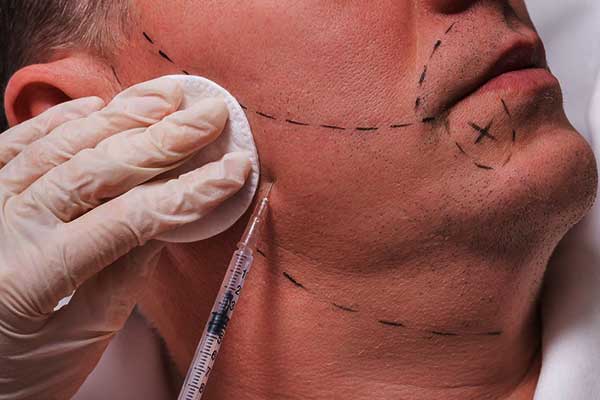
Beard transplantation in Turkey
The process of transplanting chin or beard hair is one of the most important hair transplants in Turkey, and beard hair transplantation can be obtained in Turkey at distinguished prices and with guaranteed results in many hospitals, centers and clinics.
We offer you the best prices for beard transplantation in Turkey within the most famous hair transplantation center in Istanbul, Turkey, using the latest hair transplantation techniques in Turkey to obtain permanent and amazing results.
Beard hair transplantation in Turkey – beard hair transplantation is an important detail
Beard transplantation in Turkey is one of the most famous and popular surgical services offered by medical specialists in the country, and it is very popular among men who suffer from loss of beard hair or who want to increase its density. It uses modern techniques and advanced tools to obtain very natural and satisfactory results, and is characterized by speed, safety and efficiency. In this article, we will shed light on the advantages of beard hair transplantation in Turkey, its types, costs, surgical steps, and the most important tips that must be followed after the operation.
In this article, you will find everything you need to know about beard hair transplantation in Turkey, from the advantages and types of this service to the cost of the operation and important tips to get the best results.
Advantages of beard hair transplantation in Turkey
Beard hair transplantation in Turkey is one of the advanced and distinguished surgical services that is characterized by many advantages, as some of these features include:
1- Natural results: Modern techniques and advanced tools are used to grow natural hair, which is distinguished by the texture, density, and natural color of the hair, which leads to obtaining very natural and satisfactory results.
2- The speed of the operation: The process of beard hair transplantation in Turkey is characterized by its speed, as the operation can be performed within several hours and without the need to stay in the hospital for a long time.
3- Safety and Efficiency: The process of beard hair transplantation in Turkey is performed by specialized doctors with high experience in this field, which leads to increased safety and efficiency in the process.
4- Appropriate prices: The costs of beard hair transplantation in Turkey are distinguished by the way compared to some other countries, which makes it the best option for many men who want to grow beard hair.
5- Luxurious accommodation: Patients who undergo beard hair transplantation in Turkey are provided with luxurious accommodation, where accommodation is provided in luxury hotels and resorts with full care by the medical team involved in the operation.
Types of beard hair transplantation in Turkey
There are many types of beard hair transplantation in Turkey, which differ according to the cultivation technique and materials used, as follows:
FUE (Follicular Unit Extraction): This technique is used to transplant hair in small areas of the beard. Small follicles are extracted with a micro-needle device and then implanted in the area to be rejuvenated. This technique is characterized by the absence of scars and it is painless.
FUT (Follicular Unit Transplantation): This technique is used to transplant hair in larger areas of the beard. A strip of skin is extracted from the back of the head, then cut into small follicles and implanted in the area to be rejuvenated. This technique provides a greater number of follicles, but leaves scars.
DHI (Direct Hair Implantation): This technique is used to transplant hair in small to medium areas of the beard. The follicles are extracted by a special mechanical device and then implanted directly in the area to be renewed. This technology provides fast and natural results.
Sapphire FUE technique: This technique is one of the FUE techniques, but the tools used in it are made of synthetic sapphire known as “sapphire”. This technology allows for more precise cuts and less damage to the skin.
Robotic FUE: This technique uses robots to extract grafts and implant them in the area to be rejuvenated. This technology is accurate and results guaranteed.
Beard hair transplant costs in Turkey
As for the costs of beard hair transplantation in Turkey, it varies according to the type and technique used, and the clinic that performs the operation. It is possible that the costs of beard transplantation in Turkey are much cheaper than what is collected in other countries. The costs of beard hair transplantation in Turkey range from $2,000 to approximately $7,000.
- FUE beard transplant: The cost of this type ranges from approximately $2,000 to $4,000.
- DHI beard transplantation: The cost of this type ranges from approximately $3,000 to $5,000.
- FUT Beard Transplant: The cost of this type ranges from approximately $4,000 to $7,000.
The cost is determined based on the size of the area to be transplanted, the technique used, the experience of the surgeon, and the area in which the clinic is located.
In addition, beard hair transplantation in Turkey has several advantages, such as the speed of recovery and the lack of a long recovery period. Doctors in Turkey are highly skilled and experienced in this field, in addition to the availability of the latest medical technologies used in the process.
Steps for beard hair transplantation in Turkey
Beard hair transplantation in Turkey is performed in different stages according to the type of operation and the cultivation technique used. The following are the steps for the process of beard hair transplantation in Turkey:
1- Anesthesia of the recipient area: The area where the hair will be transplanted is anesthetized using a local anesthetic, and the needles are inserted very carefully to avoid any injury.
2- Fine Needle Surgery: Fine needles are used to collect hair from the back of the head or the area of selected donors. This process is done completely manually by well trained surgeons to avoid any damage to the hair.
3- Opening channels: All required channels are made in the received area, and this is done using a device called “the receiver” which allows opening narrow channels faster and more accurately.
4- Hair transplantation: Each hair follicle is implanted in the channel corresponding to the natural direction of hair growth. The process is carefully orchestrated to ensure that each hair follicle has enough blood to survive after transplantation.
5- Cleaning the transplanted hair: The transplanted area is cleaned after the operation, and washed gently to avoid removing any hair.
6- Follow-up and care: Detailed instructions are provided on how to properly care for the transplanted hair after the procedure, and they must be followed carefully to ensure ideal results.
The most important tips after beard hair transplantation in Turkey
After performing a beard hair transplant in Turkey, it is important to follow some important tips to get good results and avoid any complications. Among these tips:
Follow your doctor’s instructions exactly: You must follow your doctor’s instructions exactly, including wound care instructions and dietary and hygiene guidelines.
Avoid smoking: Smoking should be avoided for at least two weeks after the surgery, as smoking hinders the wound healing process and affects hair growth.
Attention to hygiene: You must maintain the cleanliness of the transplanted area and follow the doctor’s advice for wound care to avoid any infection.
Avoid exposure to the sun: exposure to direct sunlight should be avoided for two months after surgery, and it is preferable to wear a hat and sunglasses when going out.
Maintaining balanced nutrition: You must maintain eating foods rich in vitamins and proteins to promote hair growth and wound healing.
Avoiding alcoholic beverages: You should avoid consuming alcoholic beverages for two weeks after surgery, as alcohol hinders the wound healing process.
Avoid strenuous exercise: strenuous exercise and strenuous sports should be avoided for two weeks after surgery.
Maintaining moisture: The cultivated area must be kept moist and not allowed to dry out.
